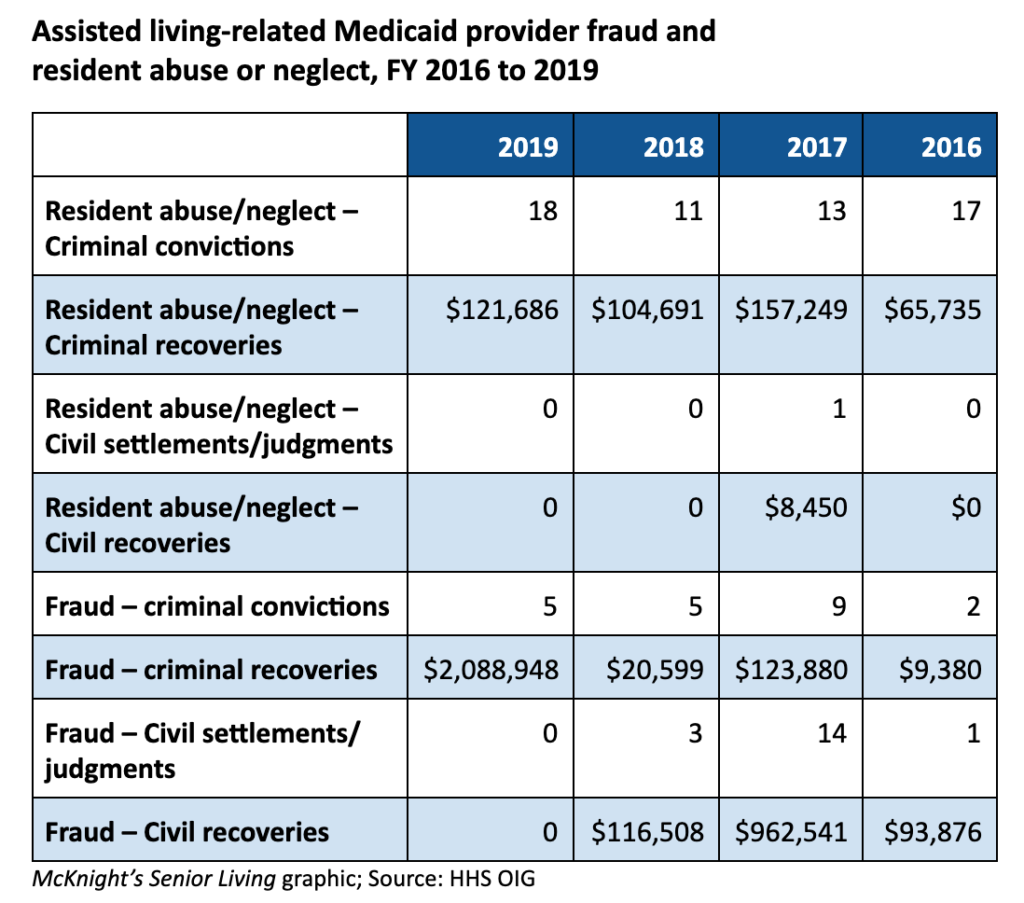
Efforts by state Medicaid Fraud Control Units resulted in a total of 23 criminal convictions and more than $2.2 million in criminal monetary recoveries related to assisted living in fiscal year 2019, according to an annual report released Friday by the Department of Health and Human Services Office of Inspector General.
Investigations of facility-related Medicaid fraud in assisted living by the MFCUs in 2019 led to five criminal convictions and recoveries of almost $2.1 million, the report noted.

The amount far exceeds the fraud-related criminal recoveries associated with assisted living noted in recent years’ reports. For fiscal year 2018, for instance, $20,599 in such recoveries was reported; in 2017, the amount was $123,880, and in 2016, the number was $9,380.
The jump in fiscal year 2019, the Office of Inspector General told McKnight’s Senior Living, was due mainly to a case in Alaska that resulted in $2.05 million in fraud recoveries.
As McKnight’s Senior Living previously reported, the case began after a resident of the Eye to Eye Assisted Living Home, Gilbert Nashookpuk, murdered a caretaker in November 2015. He subsequently was sentenced to 60 years in prison.
Eye to Eye ALH was operated by Margaret Williams and her company, Flamingo Eye LLC, with assistance from Williams’ daughter, Princess Turay, and others.
“The Anchorage police department solved that murder quickly, but then licensing … went in and said, ‘We see that you billed for three caretakers. We want to talk to the other caretakers to see if they feel safe,” Alaska Assistant Attorney General Eric Senta, who prosecuted the case, told McKnight’s Senior Living. “And Margaret Williams and Princess Turay both said, ‘Oh, she was the only one working at the time.’ And licensing said, ‘Wait a minute. You’ve been billing for three, and you’re telling us only one was working?’ So that’s when it came on to our desk.”
In May 2019, Flamingo Eye was sentenced to pay the fine of up to $2.05 million for the fraud, after Williams and others were convicted of billing Medicaid for services not provided to disabled people residing in their assisted living facilities. (Read more about the case here.)
“And that’s just for the fines levied against the defendants after conviction. It does not include restitution,” Senta said. The government is seeking $1.1 million in restitution, but litigation is pending. Whatever the final amount, it may show up on a future MFCU annual report, he said.
Abuse and neglect-related convictions and recoveries
Across the country during 2019, assisted living resident abuse or neglect investigations by the Medicaid Fraud Control Units led to 18 criminal convictions and recoveries of $121,686, an amount more in line with previous years.
“Most MFCU cases occurring at ALFs involve patient abuse or neglect rather than fraud,” the OIG told McKnight’s Senior Living. That’s because assisted living facilities “customarily receive little or no Medicaid reimbursement” that could lead to fraud, the office said.
At the end of the year, 202 criminal cases related to assisted living resident abuse or neglect remained open, according to the OIG, and 44 criminal cases and eight civil cases involving assisted living-related fraud remained open.
The OIG report also details abuse, neglect and fraud cases and outcomes related to other types of facilities as well as programs and providers. Personal care services attendants and agencies were convicted of fraud more than any other provider type, accounting for 44% of total convictions, according to the OIG. Nurses or nurse aides were convicted for abuse and neglect more than any other provider type, accounting for 44% of total convictions, the agency said.
Across all settings and positions noted in the report, there were 1,527 convictions, 658 civil settlements and judgments, $305 million in criminal recoveries and $1.6 billion in civil recoveries. California had the highest number of investigations, Ohio had the highest number of indictments and convictions, New York had the highest number of civil settlements and judgments, and Virginia had the highest dollar amount of recoveries. (State statistics are in this interactive map and this table.)
Unit efforts involving nursing facilities led to a total of 36 criminal convictions, 29 settlements or judgments and more than $31 million in criminal and civil recoveries in 2019.



